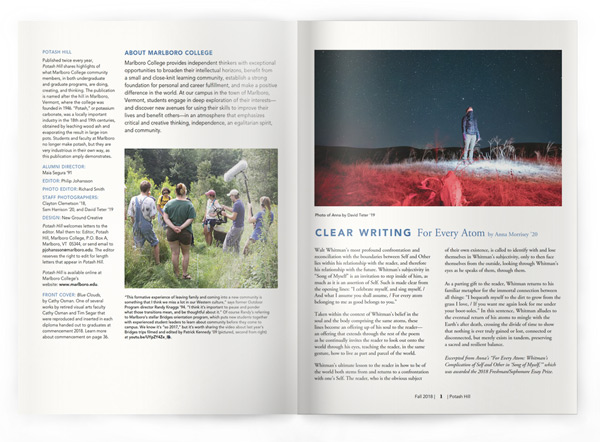Clear Writing

For Every Atom
by Anna Morrisey ’20
Walt Whitman’s most profound confrontation and reconciliation with the boundaries between Self and Other lies within his relationship with the reader, and therefore his relationship with the future. Whitman’s subjectivity in “Song of Myself” is an invitation to step inside of him, as much as it is an assertion of Self. Such is made clear from the opening lines: “I celebrate myself, and sing myself, / And what I assume you shall assume, / For every atom belonging to me as good belongs to you.”
Taken within the context of Whitman’s belief in the soul and the body comprising the same atoms, these lines become an offering up of his soul to the reader— an offering that extends through the rest of the poem as he continually invites the reader to look out onto the world through his eyes, teaching the reader, in the same gesture, how to live as part and parcel of the world.
 Whitman’s ultimate lesson to the reader in how to be of the world both stems from and returns to a confrontation with one’s Self. The reader, who is the obvious subject of their own existence, is called to identify with and lose themselves in Whitman’s subjectivity, only to then face themselves from the outside, looking through Whitman’s eyes as he speaks of them, through them.
Whitman’s ultimate lesson to the reader in how to be of the world both stems from and returns to a confrontation with one’s Self. The reader, who is the obvious subject of their own existence, is called to identify with and lose themselves in Whitman’s subjectivity, only to then face themselves from the outside, looking through Whitman’s eyes as he speaks of them, through them.
As a parting gift to the reader, Whitman returns to his familiar metaphor for the immortal connection between all things: “I bequeath myself to the dirt to grow from the grass I love, / If you want me again look for me under your boot-soles.” In this sentence, Whitman alludes to the eventual return of his atoms to mingle with the Earth’s after death, crossing the divide of time to show that nothing is ever truly gained or lost, connected or disconnected, but merely exists in tandem, preserving a sacred and resilient balance.
Excerpted from Anna’s “For Every Atom: Whitman’s Complication of Self and Other in ‘Song of Myself,’” which was awarded the 2018 Freshman/Sophomore Essay Prize.
Photo of Anna by David Teter ’19
